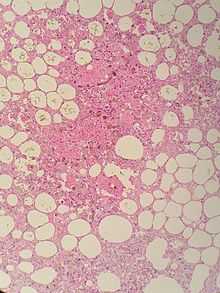Idiopathic sclerosing mesenteritis

Idiopathic sclerosing mesenteritis (ISM) or mesenteric panniculitus is a rare disease of the small intestine, characterized by chronic inflammation and eventual fibrosis of the mesentery.[1]
Epidemiology
The disease is extremely rare and has only been diagnosed in about an estimated 300 patients worldwide to date (as of 2014). It is probably under diagnosed.
- Above is inaccurate. There are substantially more than 300 diagnosed as of 2014. Not sure where that fact is coming from. That is very old information.
Cause
The cause is unknown.
Signs and symptoms
While some patients present with no or nearly no signs or symptoms, others have chronic and severe pain in the abdomen as the most common chief complaint. Other significant problems include trouble with digestion of food or even specific food types, with some patients finding it very helpful to stick to a diet of specific foods that they have figured out over time work for them. Other patients have chronic problems with bowel movements, resulting in diarrhea, bloating, gas, and cramping ranging from severe to mild.
Research
Daryl S. Pardi of the Mayo Clinic in Rochester, MN, is considered to be the ultimate authority on sclerosing mesenteritis in North America, as he is one of only several doctors who have done research and treatment trials with a significant number of patients. Pardi and his partners conducted a study of 91 patients (92 patients, see the report) with widely ranging severity of their symptoms and has found that, depending on the stage of the scarring and fibrosis, there are several different possibilities for drug treatment to halt the progression of the disease. Some patients benefit from colchicine (typically prescribed for gout), prednisone (steroids), tamoxifen (traditionally prescribed as a breast cancer drug), and thalidomide, which was originally used in pregnant women for morning sickness until it was discovered that it caused horrific birth defects.[2]
- Other drugs used to treat are as follows as of 2014:
Tamoxifen Colchicine Azathioprine Prednisone Methotrexate Trental Remicade
References
- ↑ Viswanathan, Vijay; Murray, Kevin J (2010). "Idiopathic sclerosing mesenteritis in paediatrics: Report of a successfully treated case and a review of literature". Pediatric Rheumatology (BioMed Central) 8 (5). doi:10.1186/1546-0096-8-5.
- ↑ S Akram, DS Pardi, JA Schaffner, TC Smyrk. Sclerosing mesenteritis: clinical features, treatment, and outcome in ninety-two patients. Clin Gastroenterol Hepatol. 2007; http://www.ncbi.nlm.nih.gov/sites/entrez?Db=pubmed&Cmd=DetailsSearch&Term=17478346%5Buid%5D